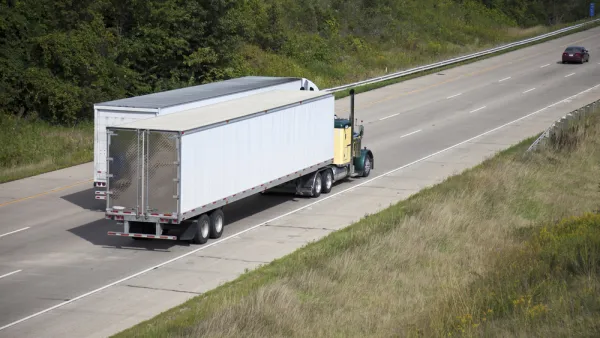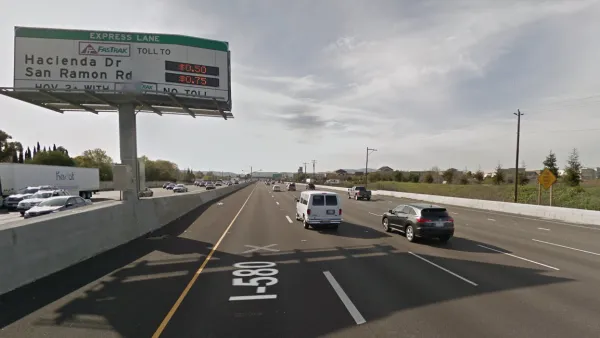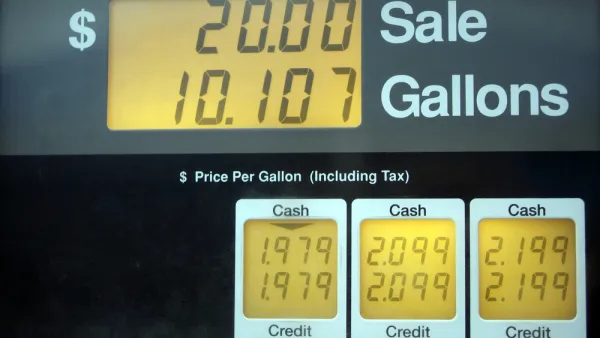The Congressional Budget Office takes aim at transportation funding and spending. It notes with alarm a $143 billion federal subsidy since 2008 and recommends charging motorists directly via vehicle-miles-traveled fees and road tolls.
With the passage of the five-year, $305 billion transportation reauthorization bill known as the FAST Act last December federal highway subsidies have entered a new era. "Since 2008, lawmakers have transferred about $143 billion from other sources to maintain a positive balance in the trust fund," states the summary to the 40-page, Feb. 11 CBO report, "Approaches to Making Federal Highway Spending More Productive" [PDF].
The other alarming consideration noted by report authors Chad Shirley and Nathan Musick is that "adjusted for changes in construction costs, total federal spending on highways buys less now than at any time since the early 1990s."
The report also looks at how the funds are spent, observing that "(s)pending on highways does not correspond very well with how the roads are used and valued."
For example, even though highway travel is more concentrated on Interstates and in urban areas, and urban roads are typically in poorer condition than rural ones, the federal government and state governments typically have spent more per mile of travel for major repairs on rural roads.
The report offers "(t)hree approaches that the Congress should consider would make highway funding and spending more productive:"
- "Have the federal government—or allow states or private businesses to—charge drivers directly for their use of roads more often, including charging them more for using roads when traffic is more congested;
- "Allocate funds to states on the basis of the benefits and costs of specific programs and projects; and
- "Link spending more closely to performance measures—such as ones for traffic congestion or road quality—by providing additional funds to states that meet standards or penalizing states that do not."
Chapter Two delves into alternative funding approaches. It makes three recommendations to policy makers so that they "could incorporate more direct pricing of the use of roads":
- "Implementing VMT charges;
- "Facilitating more congestion pricing; and
- "Allowing tolling on additional existing Interstates."
On that last note, the FAST Act made some changes—good for states willing and ready to add tolls to interstates, not good for Missouri, North Carolina and Virginia—the three states that had prior authorization to add tolls. They now "will have one year to move ahead with plans to add tolls or lose their slots to other states ready to add tolls to their highways," wrote Ron Nixon And Danielle Ivory for The New York Times. "The new states then would have three years to complete projects or be removed from the pilot."
VMT fees are clearly making progress on the state level. Using the term "road usage charge," they are now applied a limited program (OReGO) in Oregon that began last July, and California will begin a pilot program this summer.
The FAST Act provide $95 million for states "to test gas tax alternatives," including VMT Fees.
Hat tip to L.A. Transportation Headlines.
FULL STORY: CBO Report: Approaches to Making Federal Highway Spending More Productive – Feb 11

Analysis: Cybertruck Fatality Rate Far Exceeds That of Ford Pinto
The Tesla Cybertruck was recalled seven times last year.

National Parks Layoffs Will Cause Communities to Lose Billions
Thousands of essential park workers were laid off this week, just before the busy spring break season.

Retro-silient?: America’s First “Eco-burb,” The Woodlands Turns 50
A master-planned community north of Houston offers lessons on green infrastructure and resilient design, but falls short of its founder’s lofty affordability and walkability goals.

Test News Post 1
This is a summary

Analysis: Cybertruck Fatality Rate Far Exceeds That of Ford Pinto
The Tesla Cybertruck was recalled seven times last year.

Test News Headline 46
Test for the image on the front page.
Urban Design for Planners 1: Software Tools
This six-course series explores essential urban design concepts using open source software and equips planners with the tools they need to participate fully in the urban design process.
Planning for Universal Design
Learn the tools for implementing Universal Design in planning regulations.
EMC Planning Group, Inc.
Planetizen
Planetizen
Mpact (formerly Rail~Volution)
Great Falls Development Authority, Inc.
HUDs Office of Policy Development and Research
NYU Wagner Graduate School of Public Service




























